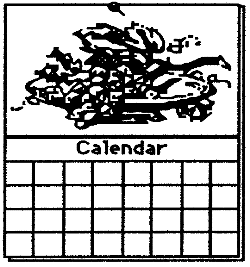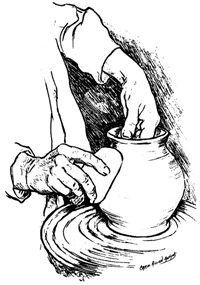Unit 38: The Calendar
The Calendar

All nations have their own ways of saying things about past time and the different historical events important to them.
Some make reference to the Buddha, some to Mohammed, and so on.
It has been very hard to make sense of the historical relations between nations because of the differences between their systems of keeping their records, or calendars.
The early Egyptians and Babylonians had calendars.
It is thought by experts in the measurement of time that the invention of the calendar to mark off the years was a very important thing.
In countries where talk is in English, historical events have been related to the birth date of Christ.
The two main divisions of history are B.C. and A.D.
Time before the birth of Christ is given by B.C..
Time after Christ's birth is given by A.D. Those letters are short for two words which are about "the birth of our Lord".
Historical records usually have these letters after the year named.
Just have in mind that the number of the year gets larger the further you go from the birth of Christ, both before and after.
Each year has 12 months in 4 seasons.
The seasons are:
Summer, Winter, Autumn and Spring usually said in that order.
The 3 months of each season in Australia are:
| Season
| Early
| Mid
| Late
|
| Summer
| December
| January
| February
|
| Autumn
| March
| April
| May
|
| Winter
| June
| July
| August
|
| Spring
| September
| October
| November
|
Early Summer is in December, mid Summer is in January, late Summer is in February.
Days of the Week
In each month, the weeks are divided into the seven days:
Each of these days had a religious relation in the early days of English Society, but that is only a matter of interest to you now.
If you have some knowledge of these names you will quickly become familiar with the Calendars which show them in the country with which you have connections.
The longest day of the year comes on the 21st/22nd December.
The shortest on 21st/22nd June;
Equal lengths of day and night are on 21st / 22nd of both March and September.

In The Potter's Hand
The word which came to Jeremiah from the Lord, saying, Up!
go down to the potter's house, and there I will let my words come to your ears.
Then I went down to the potter's house, and he was doing his work on the stones.
And when the vessel, which he was forming out of earth, got damaged in the hand of the potter, he made it again into another vessel, as it seemed good to the potter to make it.
Then the word of the Lord came to me, saying, O Israel, am I not able to do with you as this potter does?
says the Lord.
See, like earth in the potter's hand are you in my hands, O Israel.
Additional Reading
In 1956 a clever man took a careful look at some old writings imprinted on earthen plates which had been put away carefully in Britain.
They had been found in Mesopotamia some time earlier and brought to Britain.
They were as hard as stone and were in a very strange form of writing.
Only an expert could say what the meaning of the writing might be.
They had been made in the times of the wise and holy man, Jeremiah.
They were a history of events at that time that was quite separate from the Book of Jeremiah.
The good thing about them is that both they and Jeremiah's sayings are in agreement.
The potter is given here as a picture of the power of God in making the future of His people.
Jeremiah made use of that idea in saying that the way his nation had to take was complete attention to God's will.
As the potter could make, bring destruction to, and remake the vessel he was forming out of the earth, so the nation could be made or come to destruction.
The necessary thing for the potter was to have the earth he used soft and manageable.
Israel was also to be like that.
The trouble was that the nation was doing wrong and the religious leaders were giving them help in the wrong doing.
This put Jeremiah in a very serious position.
He was responsible to God for giving his countrymen the knowledge of God's purposes for them.
But, they did not have any interest in what he had to say.
The poor degree of attention they gave to him came about as a response to the complex mixed up situation in which they found themselves.
The times were very hard.
Their small country seemed to be under the control of very powerful nations that lay to the north and to the south of them.
They had no respect for the measures Jeremiah said were important for their future.
The people let his sayings go by with a laugh or even with a desire for his punishment.
He was at times put in prison for the fact that he was God's representative to them.
He even went close to losing his life.
There was no harmony between Jeremiah and his countrymen because the times saw a lot of trouble and destruction.
The men who are experts on changes in past weather conditions have made the observation that this was a time when every day existence was hard.
The weather was gradually getting colder over a very long time and thus food stores were becoming lighter.
Of course, the rhythm of change makes it hard to say things were fixed at any one level.
But all the nations were taking steps to put their own development first.
That led to a lot of competition between them.
So, Jeremiah lived in important times historically.
His statements were about important facts of everyday life in hard times.
He had a very deep relation to God and to the desires of his nation in times of great need.
We may learn a great amount from Jeremiah.
His sayings under those hard conditions seem equally important now as then.
Above all, he gave attention to the need to have right purposes in all that is done and not to see acts of religion as the only quality that has God's approval.
He said that to be right with God it is necessary to be as manageable as soft earth in the potter's hand.
Helpful Notes
| potter's house
| the place where earth was made into useful vessels.
|
| work on the stones
| the potter worked on a stone wheel.
|
| earthen plates
| these were made use of for early records.
|
| strange form of writing
| the marks used for an early language.
|
| rhythm of change
| good or bad reactions coming one after another.
|
| manageable as soft earth
| ready adjustment .
|